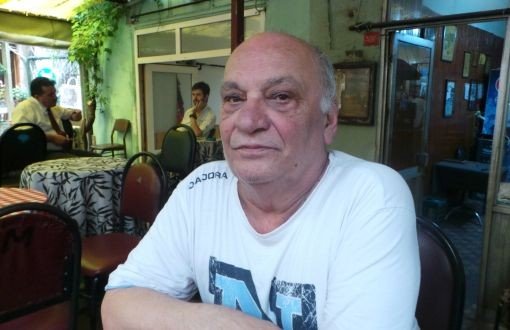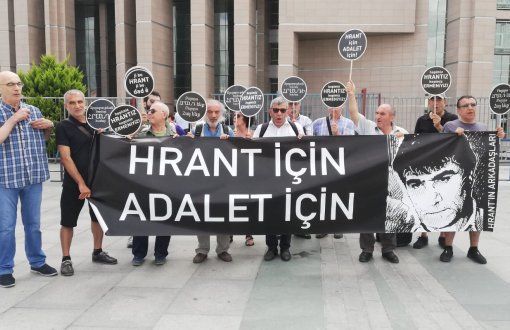STRUGGLE FOR PRESS FREEDOM DAY
Eryılmaz: When a journalist is afraid to ask the PM questions!

Tuğrul Eryılmaz has been a journalist since 1974. In his 38 years of journalism he worked in various different places, from the state television channel TRT to leftist publications and Radikal newspaper, and taught journalism at college level.
Tuğrul Eryılmaz was fired from his chief-editor position of 16-years at Radikal newspaper’s political commentary and discussion supplement Radikal 2 as a result of the newspaper’s “digitalizing policy”. Shortly after that, Radikal 2 was closed altogether.
One of Turkey Journalists Association’s (TGC) July 24 Press Freedom Awards this year belongs to Tuğrul Eryılmaz.
bianet spoke with Rolling Stones fan, journalist, TRT, Nokta, Sokak, Yeni Gündem, Cumhuriyet, Radikal veteran, IPS Communication Foundation Steering Committee Member Eryılmaz about his 38-year struggle for press freedom and about journalism.
Journalism back in the day
Why did you become a journalist?
I didn’t have a childhood fancy of becoming a journalist. I was abroad, I came to Turkey; I didn’t have any money. I’d studied Political Science in Ankara University. TRT held an exam and I took it.
I’d liked the reporting business; six months in I said, let me really take a shot at it. And what’s more, in those days, the pay was good, you got your payment, you were a journalist, it had a kind of prestige then.
Did the excitement last all 40 years?
It fluctuated actually. After September 12 [the 1980 Turkey coup d’état], for instance, they called us to transform Nokta, and in 1982, to start a political magazine. We didn’t go home and slept on the tables for three or four months. I was very excited then. I experienced that same thrill again at Radikal later.
And you also dabbled in Sokak. A short adventure, but long talked about…
Sokak lasted a year. But it was something so completely different. We strove to find a way to publish that broke off completely from the mainstream. Sokak magazine is one of the first experiences of alternative media. It was the period in my life that I enjoyed the most.
Sokak, Nokta, Yeni Gündem
How were the responses?
People liked Nokta. They thought, these guys still talk about the IMF, but also of police violence, and they also have some concerns about the military.
It was in Sokak that we experienced a serious problem. Now it’s really hip, but back then defending the Kurds, defending the communists’ right to exist, writing on the greens and the environment, and also talking about, God forbid, gays and lesbians... We weren’t good by anybody because we had such concerns.
Yalçın Küçük had talked to Öcalan in 1989 even, and we ran that.
And then there is my first attempt with groups that call themselves socialist, Yeni Gündem magazine. We did a cover that said “On the Agenda: The Issue of the Kurds”. We went through a lot of problems, but we were able to do that in 1985, 1986.
I like being among firsts. I was in the right place at the right time, I met the right people, but this didn’t always go this way.
Disintegration in the media
You experienced a lot of transformations in your professional life: the 1980 coup, the 1990’s, 12 years of AKP in power, ... How did the media change throughout these years, and what did it become?
Firstly, we experienced an enormous amount of pressure from the Nationalist Front after the leftist movement was suppressed in Turkey. I witnessed this in my time at TRT and as a teaching assistant in college.
This multiplied and got especially intricate with September 12. We had to change the cover by night. Yazgülü Aldoğan was editor in chief while I was at Nokta. It’s election time. We have Ecevit on the cover. At midnight we get a call saying, you can’t have that on the cover. We didn’t go. Those there, the employers’ crew changed the cover themselves.
I remember the meetings. I remember how the people on the news site of things thought so alike in those news meetings. This gradually melted away. Those on the news side started to switch to the other side of the table and act like patrons.
But the dissolution that started in the 2000’s was more appalling.
"Journalists acting as spokespeople for media patrons”
What kind of dissolution?
What brought this dissolution was the patrons’ political connections, since they were already involved in a lot of things, and some so-called journalists’ behavior as the patrons’ spokespeople. I’m fine with people living in villas and going to the world cup with their planes, but... They do this by selling something. They’re selling their professions. Is it normal for a broadcast manager to get paid 50 times what the reporters get?
With a patron at the top, and a few favorites below him, they treated everybody like a hoard of laborers. All newspapers are that way, to be honest.
How has this affected journalists’ solidarity and organization?
When people say organization I think of unionization. There was never any organization in our profession as far as I know. The Journalists’ Union of Turkey (TGS) wasn’t so promising. And not just the TGS. Those lecturing on the organization of the working class and of the public all the time flat out sold their rights to organize. This is a travesty. At least the TGS is in a new stage of organization lately that it got in the hands of youth.
If we’re talking of organizing, The National Journalist Union has thousands of members. You can’t even become a journalist in the full sense if you don’t go through there. But everyone is allowed to be a journalist here.
The reputation of journalism
How did readers and viewer change in this process?
The profession experienced a serious loss of reputation in the eyes of the reader. But the media didn’t break down on their own. The country’s system of values broke down. The reader is not so innocent either. The experts and academicians they brought on television precipitated this as well.
Of course expert’s opinions are important. But how can you be an expert in every subject? They form the viewer’s idea of a journalist. Meanwhile the reporters chasing after unidentified murders and staying up all night in Gezi were always pushed back, out of the limelight.
"The Pool Media* was always there"
How do you view the Gezi Resistance in this process?
Gezi was crucial. But I think the media failed to follow up on the democratic advances Gezi brought. I would keep young reporters out of it, but the media is afraid. I have never practiced journalism so timidly as in the last ten years. The cause is entirely the policies maintained by the government at power. I can only compare this situation with September 12.
And what about the “Pool Media” formed after Gezi?
The Pool Media was always there. We were always sitting in the same buildings together. The man has a newspaper and a television channel; how can they be any different? But now all this is very public. Some of the rightist newspapers come out with the same headlines now.
The government grew increasingly reckless. We have this situation where media patrons are crying on the phone. Not even face-to-face, but on the phone. How awful. When a journalist is afraid to ask the Prime Minister a question, there’s nothing left to speak of.
Journalists and gunmen
There are also certain fractures within the media of late. There are some publications that have started to discuss press freedom and some oppositional newspapers within the mainstream media, unlike how it was in the past. How do you interpret these fractures?
It’s not journalism that’s done here. It’s holding the fort, or being the gunman of your political stance. People ask you where you worked beforehand. This is true for everybody, not just the Gülen Community media. For the AKP media too. It’s very wrong to confuse being a gunman with being a journalist. These people are gunmen, and there are so many of them. (EA/PU)
* “Havuz Medyası”: Media organizations bought jointly by political and industrial figureheads.
Hrant’s Friends on Watch at 75th Hearing

2 People Released from Prison in Hrant Dink Case

Hrant’s Friends are at Justice Watch at 72nd Hearing

Afrin Resident Blames ‘FSA’, Habertürk TV Translates as ‘YPG’
.jpg)
7th Hearing in Cumhuriyet Trial
.jpg)





